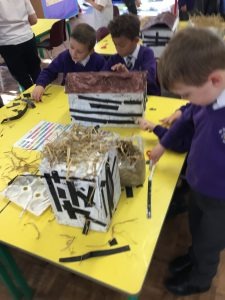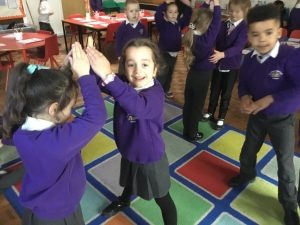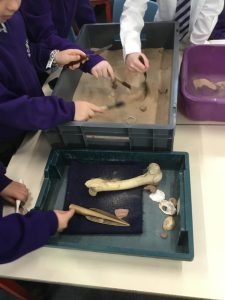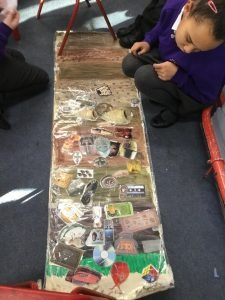History
At Florence Nightingale we are historians! We want our children to love history and for them to have no limits to what their aspirations and ambitions can be. For them to grow up wanting to be archivists, museum curators, archaeologists or research analysts. Through our high-quality history education, we help our children to gain a coherent knowledge and understanding of Britain’s past and that of the wider world. We want to enhance their curiosity and prepare them to ask perceptive questions, think critically, weigh evidence and develop perspective and judgement. We want our children to remember their history lessons in our school, to cherish these memories and embrace the historical opportunities they are presented with!
The National Curriculum for History in Years 1 and 2
Our children will be taught to:
- Changes within living memory. Where appropriate, these should be used to reveal aspects of change in national life
- Events beyond living memory that are significant nationally or globally e.g. the Great Fire of London, the first aeroplane flight or events commemorated through festivals or anniversaries
- The lives of significant individuals in the past who have contributed to national and international achievements. Some should be used to compare aspects of life in different periods e.g. Elizabeth I and Queen Victoria, Christopher Columbus and Neil Armstrong, William Caxton and Tim Berners-Lee, Pieter Bruegel the Elder and LS Lowry, Rosa Parks and Emily Davison, Mary Seacole and/or Florence Nightingale and Edith Cavell
- Significant historical events, people and places in their own locality.
*Examples in italics are not statutory.
The National Curriculum for History in Years 3 to 6
*Examples in italics are not statutory.
Pre-Roman Britain
Our children will be taught about changes in Britain from the Stone Age to the Iron Age.
This could include:
- Late Neolithic hunter-gatherers and early farmers, for example, Skara Brae
- Bronze Age religion, technology and travel, for example, Stonehenge
- Iron Age hill forts: tribal kingdoms, farming, art and culture
Roman Britain
Our children will be taught about the Roman empire and its impact on Britain.
This could include:
- Julius Caesar’s attempted invasion in 55-54 BC
- The Roman Empire by AD 42 and the power of its army
- Successful invasion by Claudius and conquest, including Hadrian’s Wall
- British resistance, for example, Boudica
- “Romanisation” of Britain: sites such as Caerwent and the impact of technology, culture and beliefs, including early Christianity
Anglo-Saxons & Scots
Our children will be taught about Britain’s settlement by Anglo-Saxons and Scots.
This could include:
- Roman withdrawal from Britain in c. AD 410 and the fall of the western Roman Empire
- Scots invasions from Ireland to north Britain (now Scotland)
- Anglo-Saxon invasions, settlements and kingdoms: place names and village life
- Anglo-Saxon art and culture
- Christian conversion – Canterbury, Iona and Lindisfarne
Anglo-Saxons & Vikings
Our children will be taught about the Viking and Anglo-Saxon struggle for the Kingdom of England to the time of Edward the Confessor.
This could include:
- Viking raids and invasion
- Resistance by Alfred the Great and Athelstan, first king of England
- Further Viking invasions and Danegeld
- Anglo-Saxon laws and justice
- Edward the Confessor and his death in 1066
Local History
Our children will be taught about an aspect of local history.
For example:
- A depth study linked to one of the British areas of study listed above
- A study over time tracing how several aspects of national history are reflected in the locality (this can go beyond 1066)
- A study of an aspect of history or a site dating from a period beyond 1066 that is significant in the locality.
Extended Chronological Study
Our children will be taught a study of an aspect or theme in British history that extends pupils’ chronological knowledge beyond 1066.
For example:
- The changing power of monarchs using case studies such as John, Anne and Victoria
- Changes in an aspect of social history, such as crime and punishment from the Anglo-Saxons to the present or leisure and entertainment in the 20th Century
- The legacy of Greek or Roman culture (art, architecture or literature) on later periods in British history, including the present day
- A significant turning point in British history, for example, the first railways or the Battle of Britain
Ancient Civilizations
Our children will be taught about the achievements of the earliest civilizations – an overview of where and when the first civilizations appeared and a depth study of one of the following:
- Ancient Sumer;
- The Indus Valley;
- Ancient Egypt; or
- The Shang Dynasty of Ancient China
Ancient Greece
Our children will be taught a study of Greek life and achievements and their influence on the western world.
Non-European Study
Our children will be taught about a non-European society that provides contrasts with British history – one study chosen from:
- Early Islamic civilization, including a study of Baghdad c. AD 900;
- Mayan civilization c. AD 900; or
- Benin (West Africa) c. AD 900-1300
Please see the link for the National Curriculum for History - National Curriculum in History.



